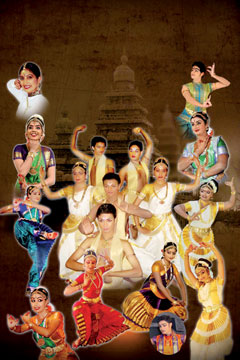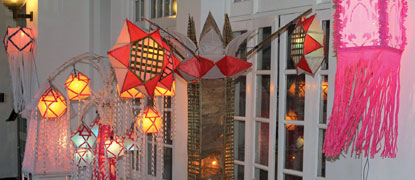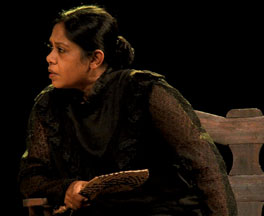Cultural DIARY
German Masterworks Concert:
Classical music lovers in for a treat
On June 4 the Symphony Orchestra of Sri Lanka will perform the German
Masterworks concert, conducted by the German Conductor Dr. Hans-Jurgen
Nagel. The highlight of the evening's programme will be the Beethoven
Violin Concerto, performed by Prof. Gottfried Schneider of the Munich
School of Music. German Masterworks is sponsored by the Embassy of
Germany, in their efforts to support the arts in Sri Lanka.
German classical music could be said to be amongst the most performed
in the world. Boasting over 130 professional orchestras with roughly
10,000 members well distributed about the country, Germany has earned
the name 'the land of Musik.'
The beginning of what is now considered German classical music could
be traced back to the 12th century comprising mainly hymns and other
Christian Latin-language music. This was then followed by
'minnesinsingers' or 'love poets' who were aristocrats travelling from
court to court creating music. Then came 'meistersingers' whose music
was more rule-based and had more form. Chorale and Baroque music
developed during the 16th and 17th centuries in Germany with composers
like Martin Luther, Dietrerich Buxtehide and Heinrich Schutz.
Originating in Italy but quickly migrating to Germany, Baroque was
the first music style to use tonality and artistic use of counterpoint.
Germany became one of the most active centres of Baroque music and
musicians like Schutz, Praetorius, Schein and Schedt. The pinnacle of
this music was undoubtedly in the work of Johann Sebastian Bach during
the first half of the 18th century. His work included preludes,
cantatas, fugues, concertos for harpsichord, violin and wind, orchestral
suites, the Brandenburg Concertos, St. Mathew Passion, St. John Passion
and the Christmas Oratorio. Bach's contemporaries were Georg Phillip
Telemann and Georg Friedrich Handel.
Orchestral
By the middle of the 18th century the cities of Vienna, Dresden,
Berlin and Mannheim were centres for orchestral music. Later in this
period, a young German, Wolfgang Amadeus Mozart, influenced by drama and
beauty of Italian music and richness of German music, mixed the two into
a style of his own. He is generally credited with the beginning of
German-language opera.
Two other great opera composers were also born during this period,
Carl Maria von Weber and Richard Wagner. Wagner introduced the simple
recurrent musical theme for important characters and ideas. He disliked
strict traditional styles and his music changed the course of opera and
music forever. Both Wagner and Weber based their operas on German
history and folklore. Other German opera composers include Richard
Strauss and Engelbert Humperdinck who both wrote for young audiences.
The romantic era of music in the 19th century saw the music of Ludwig
van Beethoven and Franz Schubert. Beethoven was a student of Haydn and
wrote unusually daring harmonies and rhythm. He composed numerous pieces
for piano, violin, symphonies, chamber music, string quartets and an
opera. Schubert created a musical canvas of artistic, romantic poetry
and music called 'lied.' Other romantic classical composers of Germany
ethnicity were Albert Lortzing, Johannes Brahms, Robert Schumann, Felix
Mendelssohn, Anton Bruckner, Max Bruch, Richard Strauss and Gustav
Mahler.
Composers
There was a divergence between German and Austrian music in the early
1900s which saw works from German composers like Kurt Weill, Paul
Hindemith and Carl Orff whose Carmina Burana remains hugely popular. Of
the first generation of GDR composers Hanns Eisler and Ernst Herman
Meyer are probably among the most famous.
In the second half of the 20th century in West Germany the Darmstadt
New Music Summer School was a major centre of European modernism.
Composers like Karlheinz Stockhausen and Hans Werner Henze studied here.
They began experimenting with electronic sounds in classical music.
Henze remains probably the most lauded living German composer. More
recently, composers such as Helmut Lachenmann and Olga Neuwirth have
explored the possibilities of extended techniques.
Every year since re-known pianist Justus Frantz started it in 1986,
the largest festival of Classical music is held in northern Germany.
Known as the Schleswig-Holstein MusikFestival, it is held over the
summer months and has been held in Kiel, Lubeck, Fleushig, Plon and
Eutin as well as at many historical sites in the area.
Today, Germany has over 80 theatre orchestras, 30 concert orchestras
and 13 radio orchestras. Public radio stations play a special role in
keeping the tradition of classical music alive and at a highly
competitive level of performance. They encourage their orchestras to
perform on par with their other international counterparts in repertoire
and prestige featuring also world famous conductors.
Apart from these, the many chamber orchestras and special ensembles
for New and Old Music in each main city and the ensembles of the up and
coming talent like the Federal Youth Orchestra and German Youth
Orchestra and the many amateur orchestras all populate the orchestral
and classical music landscape of Germany.
In Sri Lanka, regular exposure to new music experiences from Germany
and performances by German artists is through the Goethe Institute that
does much in the way of introducing Sri Lanka to German culture through
language and the Performing Arts. The concert on the 4th of June, at the
Ladies College Hall, will further enhance the strong cultural ties
between the two countries.
MuzikAAAle on June 5
MuzikAAAle, an evening of instrumentals and vocals from Disney to
Broadway - will go on the boards at the British School Auditorium on
June 5. The chief guest will be Mrs. Nirmali Wickremasinghe, Principal,
Ladies' College, Colombo. Presented by the students of Ruvini Hapugalle,
MuzikAAAle will showcase some of the best loved Snow White, Phantom of
the Opera, Little Mermaid, My Fair Lady, and a selection of songs from
Porgy and Bess by Gershwin.
Geoffrey Bawa Memorial Lecture
The Geoffrey Bawa Memorial lecture 2011 will be delivered by
Architects Wong Mun Summ and Richard Hassell Directors and founders of
the architectural practise WOHA , Singapore.
This will be held on May 27 at the kularatne Hall, Ananda College,
Colombo 10, at 6.30 p.m.
Romaya Ginigani - 2
Bandula Vithanage's Romaya Ginigani - 2 will be staged at the
Navarangahala, Colombo 7 on May 29 at 6.30 p.m.
The cast include Sampath Thennakoon, Ratna Lalani Jayakody, Bandula
Vithanage, Ayesha Dissanayake, Upali Bandara, Thilini Priyanvada and
Ishara Wickremasinghe.
Indian classical dance performance

Indian classical dances presented by Aru Sri Art Theatre will be held
on May 27 at the Indian Cultural centre 16/2, Gregorys Road, Colombo.7
at 6 pm. A variety of Indian dance styles such as Bharathanatyam,
Kuchipudi, Mohini , Kathak and Odissi will be performed by more than
twenty artists. The performance is directed and produced by
Kalasuri.Arunthathy.SriRanganathan
Vesak lantern competition at the British Council
 The British Council organised a Vesak Lantern Competition to mark the
2600th Sambuddhatva Jayanthi. Members and non members above 15 years of
age were given the opportunity to participate in the competition. The British Council organised a Vesak Lantern Competition to mark the
2600th Sambuddhatva Jayanthi. Members and non members above 15 years of
age were given the opportunity to participate in the competition.
A
number of colourful and creative vesak lanterns were developed and
submitted for the competition.
The lanterns varied in shape. There were some developed in the
traditional attapattam style, where some where shaped like lotuses and
stars.
While some were decorated with tissue paper, others were
innovative with different raw materials.
Kaushalya Fernando
 Join popular stage and screen actress Kaushalya Fernando, on CSN’s
“Celeb Chat” at 09.30 pm on Monday May 23 as she talks about the many
roles she’s played in life and continues to do so. Join popular stage and screen actress Kaushalya Fernando, on CSN’s
“Celeb Chat” at 09.30 pm on Monday May 23 as she talks about the many
roles she’s played in life and continues to do so.
Kaushalya landed her first-ever stage role by accident as a “last
minute replacement” in “Punchi Apata Dang Therei” directed by her mother
in 1979. Interestingly Sri Lankan film goers are yet to see her first
screen performance, in Ashoka Handagama’s “Sanda Dadayama” (1996), which
is still to hit the screen.
She has since then played memorable roles in ‘May mage Sandai’
(2000), ‘Boradiya Pokuna’ (2002), ‘Sulanga Enu Pinisa’ (Camera d'or at
Cannes 2005), Ahasin Wetei (In competition at Venice 2009), ‘Ira Handa
Yata (2009), ‘Aakasa Kusum’ (2008), ‘Flying Fish’ (2010) (In Competition
for Tiger Award at Rotterdam Film festival (2011), ‘Mouse’ (2011),
‘Three Wheel Diaries’ (2011)
|

